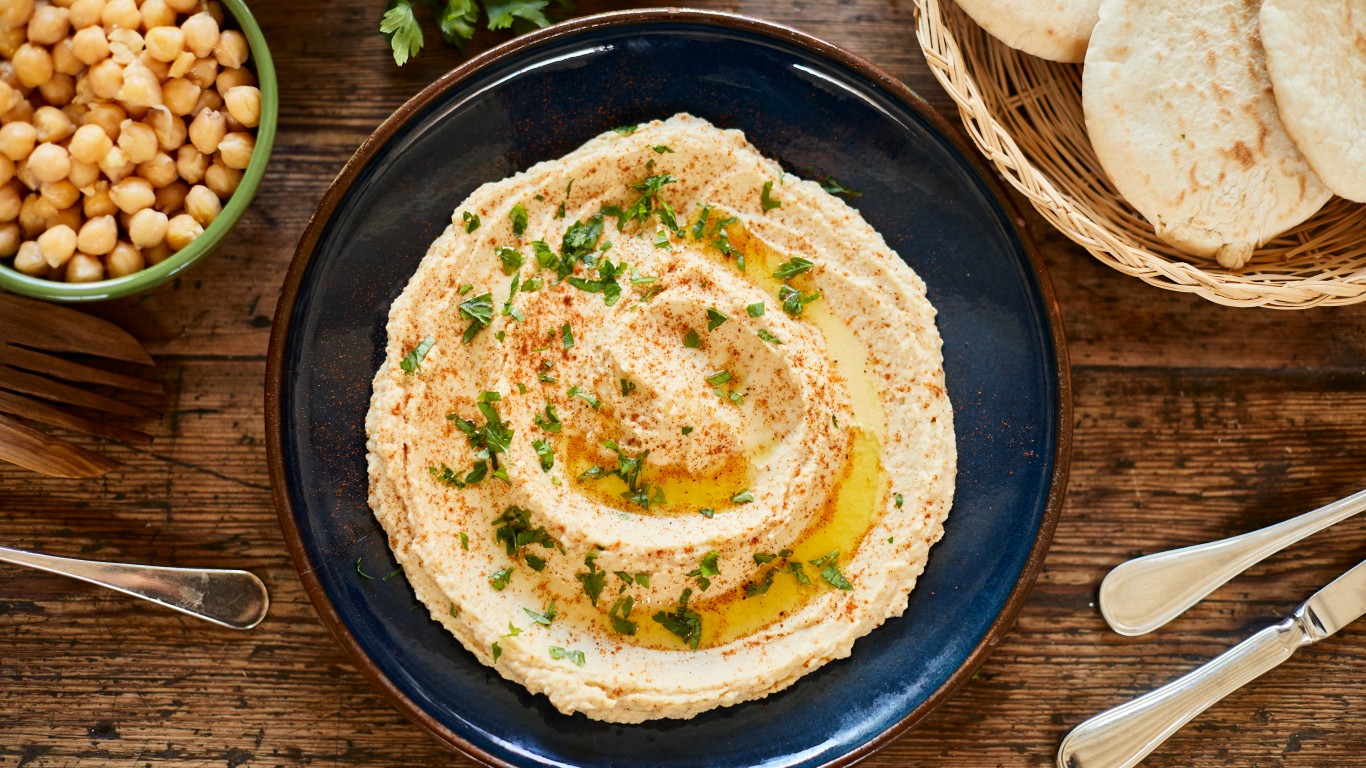Special Report
30 Everyday English Words You Didn't Know Came From Arabic

Published:

About 80% of the words used in English are borrowed from other languages – primarily from Latin, French, Greek, German, Italian, Spanish, and Dutch – but as many as 350 foreign tongues in all contribute to English. And one that is surprisingly common is Arabic – considered one of the oldest still-living languages ever spoken, dating back the eighth century B.C. (Can you answer these real “Jeopardy!” questions about words?)
To compile a list of 30 common English words with Arabic origins, 24/7 Tempo reviewed several sources, including the Merriam Webster and Oxford English dictionaries, Wikipedia, and various etymology sites. The list, which is by no means comprehensive, is ordered alphabetically.
The influence Arabic has had on English is often indirect, with words being filtered over the years through Latin, Italian, Turkish, Urdu, and a few other languages, changing the spelling, pronunciation, and sometimes meaning along the way. (The sense of words changes even within English. Here are 36 old words we use today but with completely different meanings.)
Click here to see 30 everyday English words you didn’t know came from Arabic
Many of the English words in astronomy and other sciences are derived from Arabic — for instance, zenith, acme, chemistry, algorithm. But there are also many everyday English words most people would never think are actually descendants of Arabic – including most words beginning with “al,” which is the Arabic definite article.

1. Admiral
> Arabic (phonetic transliteration): amīr
> Meaning in Arabic: military commander (amīr-al-baḥr = “commander of the sea”)
[in-text-ad]

2. Alchemy, chemistry
> Arabic (phonetic transliteration): al-kīmīā
> Meaning in Arabic: alchemy; the art of transmuting base metals

3. Alcohol
> Arabic (phonetic transliteration): al-kuḥul, al-kohl
> Meaning in Arabic: fine powder

4. Algebra
> Arabic (phonetic transliteration): al-jabr
> Meaning in Arabic: reduction, broken parts
[in-text-ad-2]

5. Assassin
> Arabic (phonetic transliteration): al-hashīshīya, hashīshīn
> Meaning in Arabic: hashish users; also the name of a Shia Muslim sect who used hashish and carried out assassinations during the Crusades

6. Carat
> Arabic (phonetic transliteration): qīrāt
> Meaning in Arabic: bean pod, a small weight
[in-text-ad]

7. Caravan
> Arabic (phonetic transliteration): qaÄ«rawÄn
> Meaning in Arabic: convoy of travelers journeying together

8. Cipher, decipher
> Arabic (phonetic transliteration): sifr
> Meaning in Arabic: the numeral zero

9. Coffee
> Arabic (phonetic transliteration): qahwa
> Meaning in Arabic: coffee
[in-text-ad-2]
10. Cotton
> Arabic (phonetic transliteration): qutn, qutun
> Meaning in Arabic: cotton

11. Elixir
> Arabic (phonetic transliteration): al-iksīr
> Meaning in Arabic: the elixir
[in-text-ad]

12. Ghoul
> Arabic (phonetic transliteration): ghūl
> Meaning in Arabic: ghoul (in Arabic folklore)

13. Giraffe
> Arabic (phonetic transliteration): zarāfa
> Meaning in Arabic: giraffe

14. Henna
> Arabic (phonetic transliteration): hinnā
> Meaning in Arabic: henna
[in-text-ad-2]

15. Hummus
> Arabic (phonetic transliteration): ḥummuṣ
> Meaning in Arabic: chickpeas
16. Jar
> Arabic (phonetic transliteration): jarra
> Meaning in Arabic: earthen water vessel
[in-text-ad]
17. Lemon
> Arabic (phonetic transliteration): laymūn, līmūn
> Meaning in Arabic: lemon

19. Magazine
> Arabic (phonetic transliteration): makhāzin
> Meaning in Arabic: storehouse
[in-text-ad-2]

20. Mattress
> Arabic (phonetic transliteration): maṭraḥ
> Meaning in Arabic: a place where something is thrown

21. Orange
> Arabic (phonetic transliteration): nāranj
> Meaning in English: a fruit with a yellowish to reddish-orange rind and a sweet edible pulp
> Meaning in Arabic: orange
[in-text-ad]
22. Satin
> Arabic (phonetic transliteration): zaytūnī
> Meaning in Arabic: of Zaytūn, seaport in China in the Middle Ages (possibly modern-day Quanzhou)

23. Soda
> Arabic (phonetic transliteration): suwwād
> Meaning in Arabic: any of several saltworts burned to obtain sodium carbonate

24. Sofa
> Arabic (phonetic transliteration): soffa
> Meaning in Arabic: carpet, divan
[in-text-ad-2]

25. Spinach
> Arabic (phonetic transliteration): isbinākh, isfānākh
> Meaning in Arabic: spinach

26. Sugar
> Arabic (phonetic transliteration): sukkar
> Meaning in Arabic: sugar
[in-text-ad]

27. Syrup
> Arabic (phonetic transliteration): sharāb
> Meaning in Arabic: alcoholic drink; any beverage

28. Tangerine
> Arabic (phonetic transliteration): Tanja
> Meaning in Arabic: the port city of Tangier, Morocco, from which tangerines were shipped

29. Tuna
> Arabic (phonetic transliteration): al-tunn
> Meaning in Arabic: tuna
[in-text-ad-2]

30. Zero
> Arabic (phonetic transliteration): sifr
> Meaning in Arabic: the numeral zero
Start by taking a quick retirement quiz from SmartAsset that will match you with up to 3 financial advisors that serve your area and beyond in 5 minutes, or less.
Each advisor has been vetted by SmartAsset and is held to a fiduciary standard to act in your best interests.
Here’s how it works:
1. Answer SmartAsset advisor match quiz
2. Review your pre-screened matches at your leisure. Check out the advisors’ profiles.
3. Speak with advisors at no cost to you. Have an introductory call on the phone or introduction in person and choose whom to work with in the future
Get started right here.
Thank you for reading! Have some feedback for us?
Contact the 24/7 Wall St. editorial team.